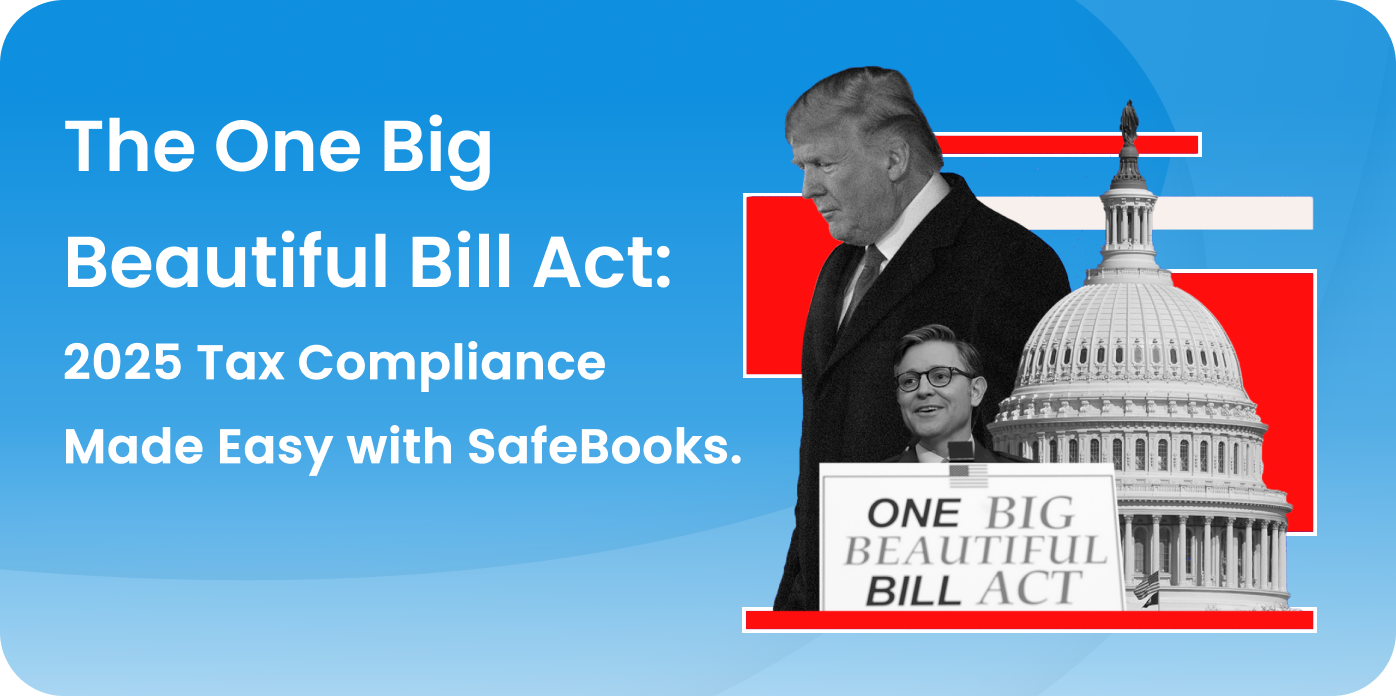The One Big Beautiful Bill Act (OBBBA), signed into law on July 4, 2025, introduces several tax changes that directly affect payroll compliance, reporting formats, and deduction tracking for U.S. businesses. As CPA firms begin preparing for year-end updates, understanding these changes early and implementing systems to manage them is key to staying compliant.
This blog explains the most relevant OBBBA provisions, outlines what actions businesses and CPA firms should take, and highlights how SafeBooks is helping clients adapt seamlessly.
What Is the OBBBA? Key Provisions
Here are the headline updates from the OBBBA affecting W-2 employees and employers:
- Standard Deduction: Raised to $15,750 for single filers and $31,500 for joint filers
- Overtime Deduction: Up to $12,500 for individuals or $25,000 for joint filers in qualified overtime wages. Must be listed separately on W-2s
- Tip Income Deduction: Up to $25,000 annually. Employers must report total tips and the occupation of the employee. The IRS will release the eligible occupation list by October 2, 2025
- 1099-NEC Threshold: Increased from $600 to $2,000, reducing compliance work for businesses that hire freelancers or independent contractors
- Sunset Date: These provisions are scheduled to expire after the 2028 tax year unless extended
(Source: CBS News – “Big Beautiful Bill: Tax Cuts by Income Group”)
What’s Changing in W-2 Reporting and Payroll Deductions?
CPA firms and payroll professionals must prepare for the most significant W-2 formatting changes in recent years. Here’s what to know:
- Overtime pay and tip income must appear on separate lines of the W-2
- Tip income reporting must also include the employee’s occupation, verified against an IRS-approved list to be published by October 2, 2025
- First updated W-2 forms must be submitted by January 31, 2026, for the 2025 tax year
- 1099 changes require firms to adjust their accounting systems for higher thresholds and potential audit clarity
Firms that delay these updates risk filing errors and increased audit exposure. Early adjustments to your payroll and client tracking systems will make a significant difference.
Timeline and Deadlines for Compliance
| Event | Date | Action |
| OBBBA Effective Date | July 4, 2025 | Begin preparing for payroll and W-2 changes |
| IRS Tip Occupation List Release | October 2, 2025 | Update job-role classifications and tip tracking |
| New W-2 Format Deadline | January 31, 2026 | Submit revised W-2s with separate boxes for tips and overtime |
| Tax Deductions Begin | 2025 Filing Year | Apply new deduction rules for qualified income |
| Sunset of Provisions | December 31, 2028 | Monitor for updates or renewal |
Why Reliable Documentation and Remote Workflow Matter More Than Ever
The IRS has made it clear: if you claim it, you must support it.
With new thresholds and reporting categories, employers and CPA firms must:
- Capture employee job roles and maintain detailed time logs
- Ensure tip and overtime data is validated and stored
- Include correct W-2 breakdowns with proper codes and fields
- Document and audit remote or outsourced services, especially if support functions are handled offshore
For firms using offshore accounting partners, like SafeBooks, audit-readiness depends on tight internal coordination, accurate task logging, and traceable workflows. It’s no longer enough to say you outsourced now; you must show what, when, and how it was done.
Supporting CPA Firms Through the 2025 Transition
SafeBooks supports U.S.-based CPA firms by combining offshore efficiency with U.S. compliance discipline. Here’s how we’re helping clients adapt to OBBBA:
- W-2 and 1099 Readiness: We ensure overtime wages and tip income are tracked and documented with occupation data, ready for the updated IRS formats
- Real-Time Tracking: Our remote teams manage contractor payments and alert clients when thresholds are reached
- Documentation Support: Each task includes time logs, approval records, and invoice-level detail, ready for audits
- Payroll Template Assistance: We provide customized checklists, W-2 mapping help, and ongoing support for your team or clients
SafeBooks isn’t just a staffing provider; we’re a systems partner helping you stay ahead of compliance expectations.
Expert Insight
“The new tax rules create room for smarter deductions, but they also demand sharper systems. At SafeBooks, we don’t just process numbers. We help firms structure their data, validate every entry, and stay ahead of compliance, no matter how complex the reporting becomes.” Shivangi Agarwal, Managing Director (CA, CPA USA), SafeBooks Global
Stay Ready With SafeBooks
The One Big Beautiful Bill Act brings opportunity, but only for those who prepare. With higher deductions come higher documentation demands. This is the moment for CPA firms to step up their systems and prove their accuracy.
Need help navigating OBBBA tax changes? Let’s Build Your Compliance Plan
FAQS
Who qualifies for the overtime and tip deductions?
Will the IRS provide an official list of eligible occupations?
Are these rules permanent?
Can I still use offshore services like SafeBooks under the new rules?
What’s the best way to prepare now?
-

Director (CA, CPA (USA))
Shivangi is a U.S.-certified CPA and Chartered Accountant with deep expertise in U.S. tax, financial reporting, and audit compliance. She has supported CPA and EA firms across sectors like real estate, SaaS, and healthcare. At SafeBooks, she leads global delivery, ensuring every remote accounting team meets U.S. standards with accuracy, discipline, and client-first execution.




